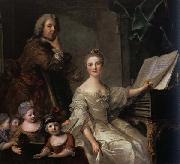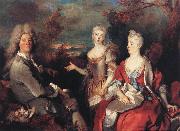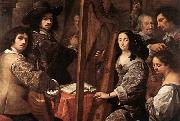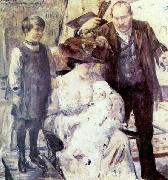
|
Jjean-Marc nattier
|
|||
|
|
|||
| French Rococo Era Painter, 1685-1766 | |||
|
|
|||
|
The Artist and his Family new2/Jjean-Marc nattier-785583.jpg Painting ID:: 26905 |
mk52 1730 Oil on canvas 142x163cm Chateau de Versailles | ||
|
|
|||
|
Nicolas de Largilliere
|
|||
|
|
|||
| 1656-1746 French Nicolas de Largilliere Gallery Nicolas de Largilli??re (October 10, 1656 - March 20, 1746), French painter, was born in Paris. His father, a merchant, took him to Antwerp at the age of three. As a boy, he spent nearly two years in London. Sometime after his return to Antwerp, a failed attempt at business led him to the studio of Goubeau. However, Largilli??re left at the age of eighteen to seek his fortune in England, where he was befriended and employed by Lely, for four years at Windsor. His skills attracted Charles II, who wished to retain him in his service, but the fury aroused by the Rye House Plot against Roman Catholics alarmed Largilli??re. He left for Paris where he was well received by Le Brun and Van der Meulen. Despite his Flemish training as a portrait-painter, his reputation was soon established. Largilli??re's brilliant colour and lively touch attracted celebrities of his day??actresses, public men and popular preachers flocked to his studio. President Lambert, with his beautiful wife and daughter, were among his most noted subjects. | |||
|
|
|||
|
The Artist and his Family new4/Nicolas de Largilliere-977238.jpg Painting ID:: 32361 |
c. 1710 Oil on canvas, 149 x 200 cm | ||
|
|
|||
|
Carlo Francesco Nuvolone
|
|||
|
|
|||
| Italian Baroque Era Painter, 1609-1662 was an Italian painter of the Baroque period, active mainly in Lombardy. He was born in Milan to an Cremonese father and mannerist painter, Panfilo Nuvolone. After working with his father, he studied under Giovanni Battista Crespi (il Cerano) in the Accademia Ambrosiana in Milan. In that studio he would have encountered Daniele Crespi and Giulio Cesare Procaccini. Of particular interest is his depiction of himself as a painter surrounded by his family of artists | |||
|
|
|||
|
The Artist and his Family new16/Carlo Francesco Nuvolone-438689.jpg Painting ID:: 43678 |
Oil on canvas transferred from panel, 126 x 180 cm | ||
|
|
|||
|
Lovis Corinth
|
|||
|
|
|||
| German Painter, 1858-1925 German painter and writer. He grew up on his family's farm and tannery. As a child he showed interest in art, taking informal lessons in drawing from a local carpenter and caricaturing his primary school teachers. Corinth's father sent him to secondary school in the nearby city of K?nigsberg (now Kaliningrad), where he lived with his widowed aunt. A superstitious woman fond of story-telling, she possessed what Corinth later described as a coarse temperament and an unrestrained, 'demonic' humour. These qualities and his aunt's bohemian acquaintances, including fortune-tellers and soothsayers, fascinated the young Corinth, accustomed to his more reserved parents. | |||
|
|
|||
|
The Artist and His Family new20/Lovis Corinth-737542.jpg Painting ID:: 58449 |
The Artist and His Family, 1909, oil on canvas, Niedersächsisches Landesmuseum, Hanover. | ||
|
|
|||
|
James Peale
|
|||
|
|
|||
| 1749-1831 James Peale Galleries James Peale (1749 ?C May 24, 1831) was an American painter, best known for his miniature and still life paintings, and a younger brother of noted painter Charles Willson Peale. Peale was born in Chestertown, Maryland, the second child, after Charles, of Charles Peale (1709?C1750) and Margaret Triggs (1709?C1791). His father died when he was an infant, and the family moved to Annapolis. In 1762 he began to serve apprenticeships there, first in a saddlery and later in a cabinetmaking shop. After his brother Charles returned from London in 1769, where he had studied with Benjamin West, Peale served as his assistant and learned how to paint. Peale worked in his brother's studio until January 14, 1776, when he accepted a commission in the Continental Army as an ensign in William Smallwood's regiment. Within three months he was promoted to captain, and during the next three years fought in the battles of Long Island, White Plains, Trenton, Brandywine, Germantown, Princeton, and Monmouth. He resigned his army commission in 1779, and moved to Philadelphia to live with his brother. In 1782 he married, after which he established his own household and artistic career. (One notable later collaboration, however, was in 1788 to make floats for Philadelphia's Federal Procession in honor of the newly drafted United States Constitution.) At the outset of his career Peale painted portraits and still-life, and by the mid-1780s had established his reputation. At about this time, however, Charles turned over his own miniature portrait practice to him, and throughout the 1790s and early 1800s Peale devoted himself to miniature painting. Much of this work was watercolor on ivory. In 1795 Peale exhibited a still life of fruit along with nine miniatures and his family portrait at the Columbianum, a short-lived art academy in Philadelphia. Around 1810, as Peale's eyesight began to weaken, he gave up painting miniatures to turn to large portraits and still-life subjects that were greatly admired and widely exhibited in Philadelphia, Boston, and Baltimore. The total number of Peale's landscape paintings remains unknown, but he executed more than 200 watercolor miniatures on ivory, perhaps 100 still-life paintings, fewer than 70 oil portraits, and at least 8 history paintings. Peale died in Philadelphia on May 24, 1831. Three of his six children became accomplished painters: Anna Claypoole Peale (1798?C1871), a miniaturist and still-life painter; Margaretta Angelica Peale (1795?C1882), painter of trompe l??oeil subjects and tabletop fruit; and Sarah Miriam Peale (1800?C1885), a portraitist and still-life painter. | |||
|
|
|||
|
The Artist and His Family new21/James Peale-323249.jpg Painting ID:: 60030 |
The Artist and His Family | ||
|
|
|||
|
Also Buy::. For Following Paintings / Artists / Products, Please Use Our Search Online: |












